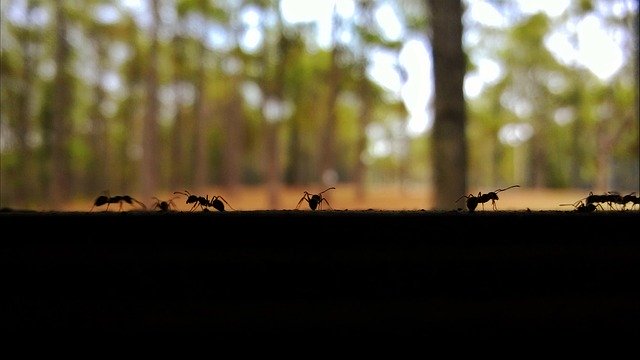Although they may be less active in the winter, ants may be found all year through. Ants often build nests outdoors and come inside to forage for food, but may also choose to build their colonies inside your home. Finding a stray ant in your house may not seem like a very large problem, but it can be an indication of a hidden infestation of hundreds or even thousands of ants.
Read More: 8 Ants That Are Likely to Invade Houston Homes
Where Do Ants Hide?
Understanding where ants are likely to hide can be helpful in taking care of an ant problem. As a general rule, it’s good to check these areas regularly for the presence of ants.
Kitchens
Just like humans, ants are fond of the kitchen because they want to be where the food is. Clean up spills as soon as they happen, regularly clean behind appliances and inside cabinets. Check for cracks in doors and windows or other potential entry points.
Bathrooms
Ants need moisture to survive, so check for leaks in water sources and drains to help eliminate problems.
Walls and Floorboards
Hollow walls in Houston homes may act as an inviting place for ants to hide their colonies, giving them access to any room in the house. In a less obvious manner, ants may also crawl inside the subflooring as well as under carpets or tiles.
Window Frames
Screens with holes in them may be an obvious entry point for ants, and window frames with gaps or rotting wood may also be an open door for ants to enter.
Concrete Slab
Unexpected but possible, ants can live in the cracks of the concrete base of your house where they can access food and water from inside your home.
Outdoor Property
Some ants like to live outdoors and find their way into your home as a food source. Hollow toys left unattended can be filled with ants and carried inside. Plants brought inside for the summer can also bring pests in with them. Ant hills just outside your home may be a gateway nest that filters ants into your home.
Ant Control and Prevention
Some simple exclusion techniques can help keep ants from getting inside your home in the first place. Close up cracks and gaps in areas that could allow scouting ants to get in. Seal windows and doors, areas where pipes or wires enter the house, and remove any tree branches or shrubs that ants might use as a “bridge” to access your home.
Keeping your house clean and tidy is one of the simplest ways to prevent and control ants. Spills and leaks draw the attention of ants so wipe them up right away. Sticky spots, crumbs, or other tasty residue acts as a personal invitation for ants to come on in. Even leaving a dirty dish in the sink overnight can draw the attention of ants. Food in cabinets should be kept sealed and trash containers should be sealed and kept emptied. Limiting eating only to the kitchen and dining room may help to minimize the risk of an ant infestation.
Outdoor eating and grilling may also a prime place for ants to come on the scene. Other outdoor areas can become homes and nests for ants, including hollow toys, rotting wood, air conditioning and heating units, or under your patio or deck.
If you find yourself with an ant infestation in your home, your best bet is to get help from a professional exterminator. Ant control problems can be thwarted through a residential pest control program to save you the headache, time, and hassle of an ant infestation.



